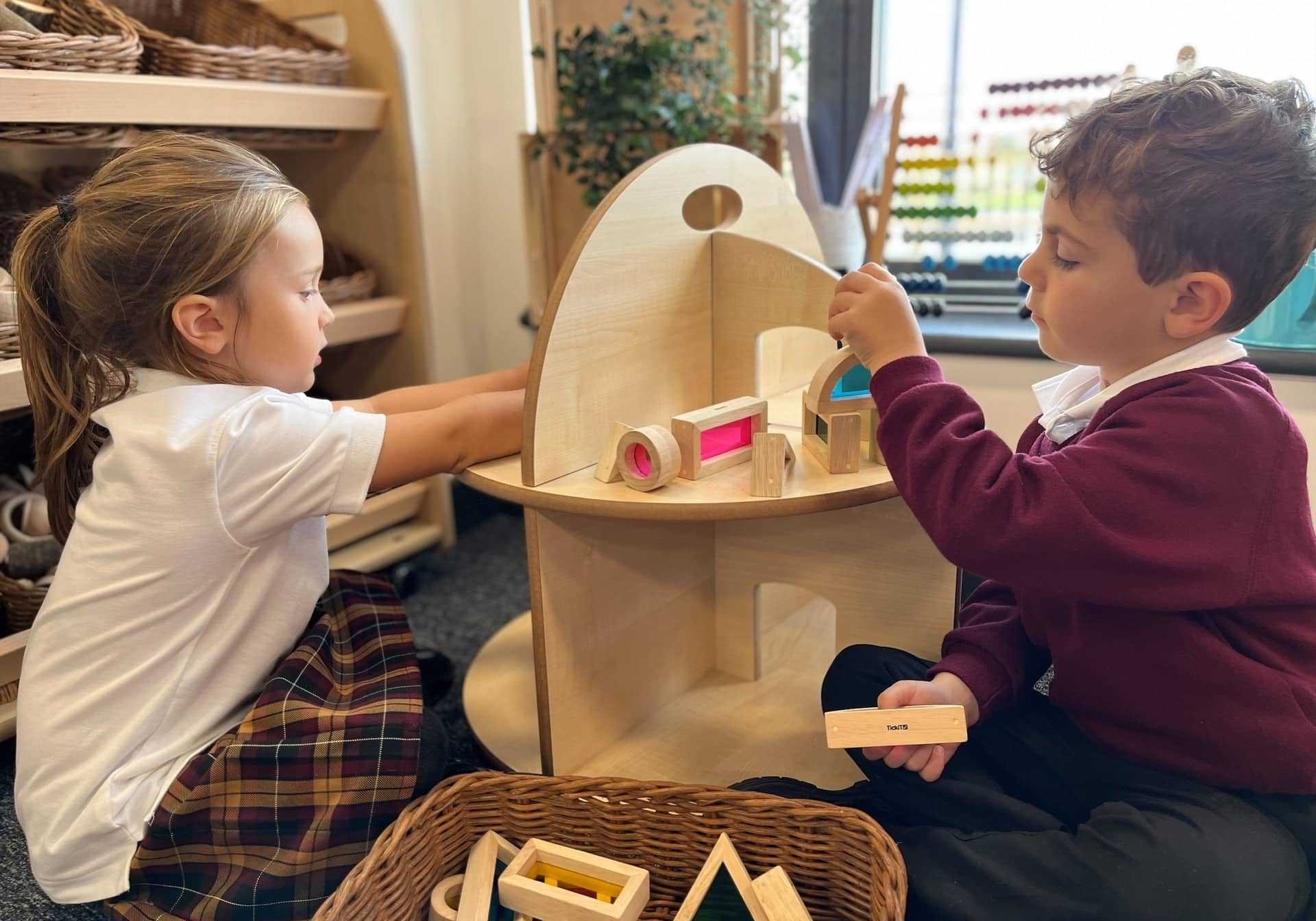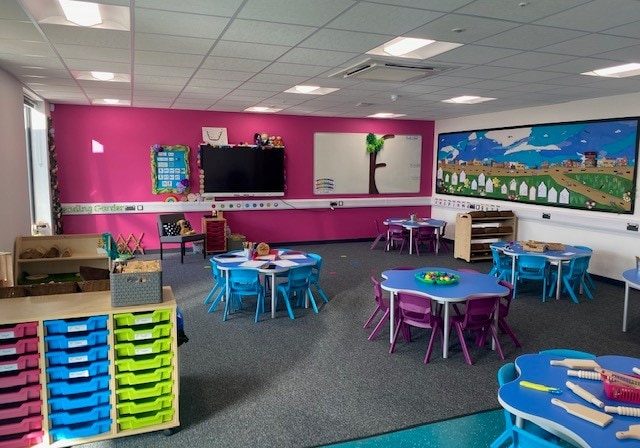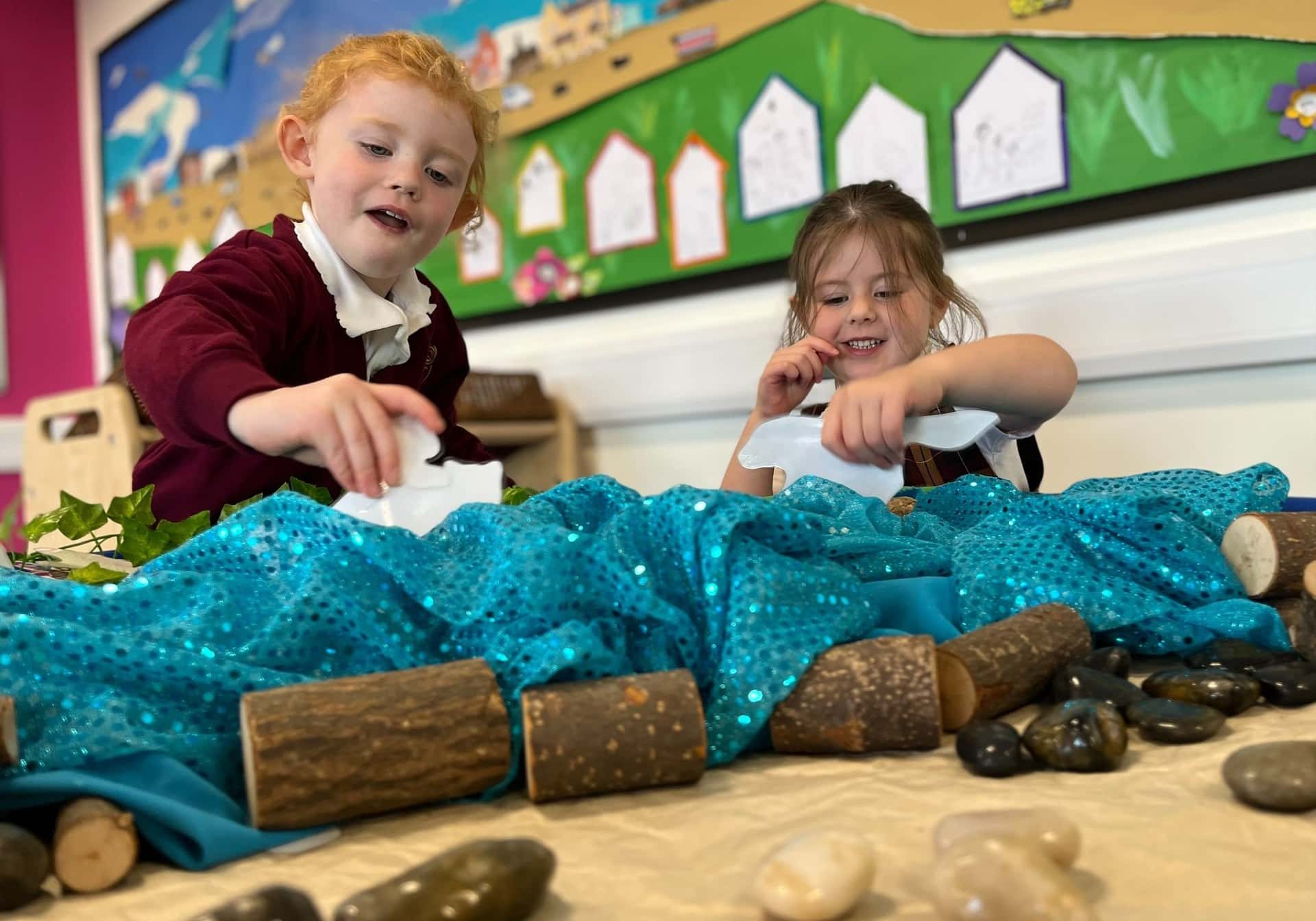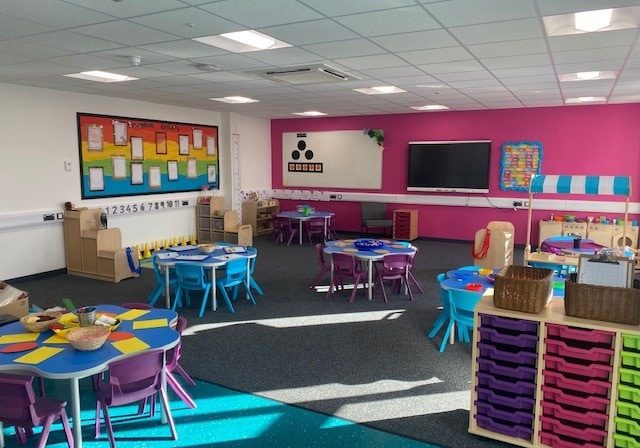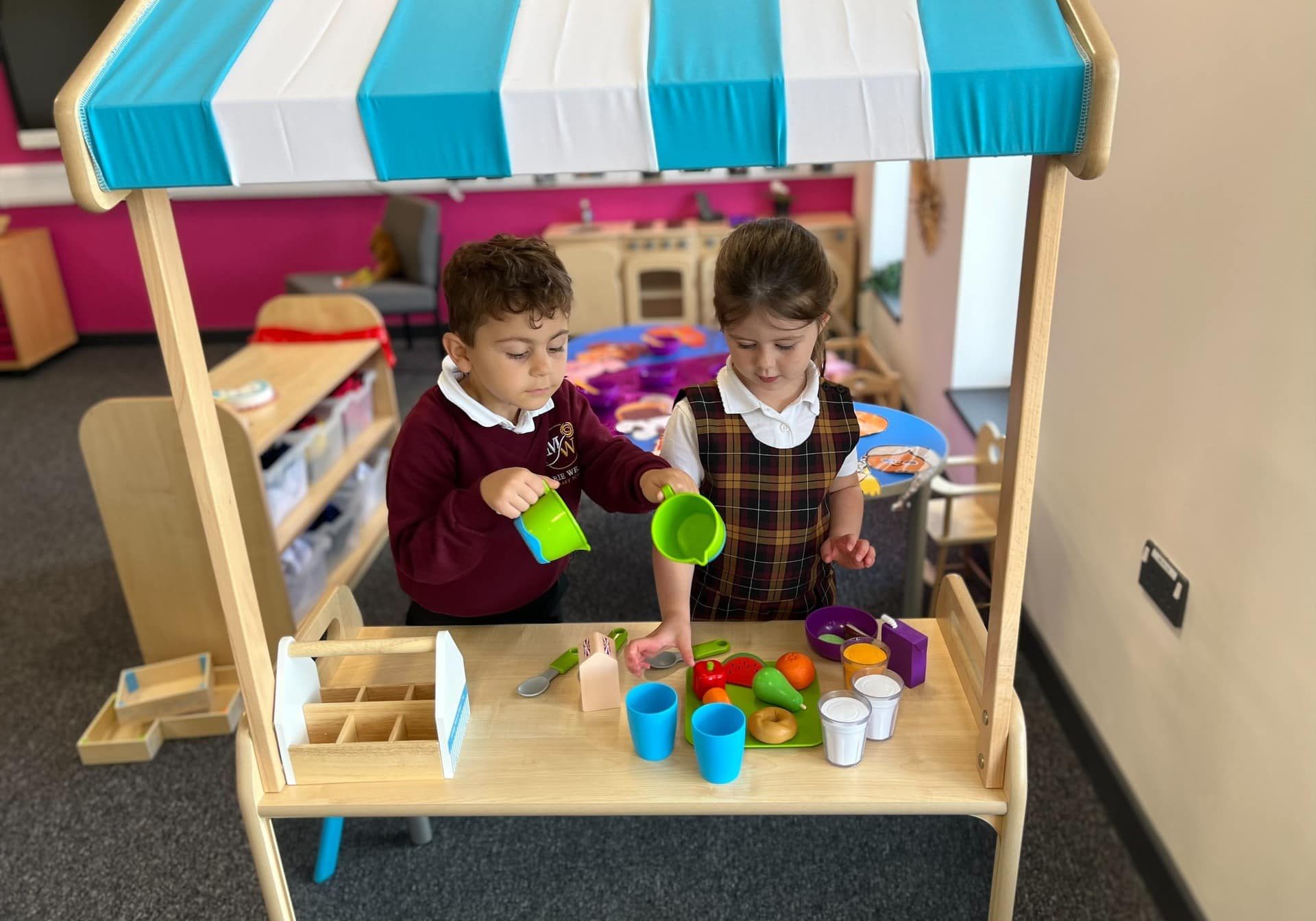In This Section
EYFS
Building Excellence For Our Children
Our mission is to ensure that our children are well educated, know how to stay safe and healthy and are able to participate as active, thoughtful members of present and future society.
- Excellence in educational standards: We are driven by the moral imperative to ensure that our pupils receive the highest quality education to equip them with the necessary skills and knowledge. We seek to provide a rich curriculum experience that aspires to academic, artistic and athletic excellence.
- Personal Excellence: We recognise that the best education is as much about developing young people’s character strengths and virtues. We have the highest aspirations for every individual as they learn and grow with us. We value respect and consideration for others, equal opportunities, hard work and fair discipline. We seek to develop skilful, curious and independent learners; foster individual resilience, confidence, and a strong sense of identity underpinned by integrity and responsibility, so that they are prepared to contribute positively to the communities and world that they belong to.
Building Curriculum Excellence
Our curriculum is underpinned by a strong moral purpose and our pupils, and our ambitions for them, will always be at the heart of our thinking and at the forefront of our actions.
Children within Marie Weller Primary School will have access to a broad, relevant, engaging and inspiring curriculum that provides opportunities and creativity to develop the whole child. We aim to provide a rich, relevant and curriculum experiences which is effectively structured, sequenced, properly planned, challenging, active and engaging.
We seek to provide curriculum and extra-curricular opportunities, particularly through high quality provision in the Arts and Sports (see our dedicated web pages for these areas); these develop character, support children’s interests, channel their enthusiasm and contribute to their progress intellectually, physically, emotionally, socially and spiritually.
Our curriculum although underpinned by expectations of the Primary National Curriculum, goes further. We aim to give all children the opportunity to grow and develop from the very earliest opportunity to reach their full potential upon leaving Key Stage 2 and onward into the next stage of their learning journey. This is delivered through a wide variety of activities and lessons, throughout the years, that excite and enthuse the children, promoting a thirst for knowledge and an appreciation of the joy of mastering new skills.
Our aim is to educate the 'whole child', developing their academic, social, emotional and physical skills, along with fostering a curiosity and willingness to take on challenges.
Our curriculum comprises detailed, planned activities that we organise in order to promote learning and personal growth and development. It includes not only the formal requirements of the National Curriculum, but endeavours to go beyond and include a rich range of additional experiences and a full programme of extra-curricular activities in order to enhance our educational offer. It also includes the ‘hidden curriculum’: what the children learn from the way they are treated and expected to behave and so our teachers are expected to model and have the highest expectations of each individual to support the best possible outcomes.
We will ensure open access and inclusivity, providing opportunities for all, irrespective of their personal characteristics. There will be no curriculum barriers – pupils will have access to all opportunities and, where there is choice, they can select appropriately, and with guidance, according to their ambitions, interests, abilities and needs.
Our shared Curriculum Intent for all our pupils has 4 main strands:
Core skills and knowledge: developing literacy, numeracy and critical thinking skills enables pupils to access the entire curriculum and mastering key knowledge and concepts so that they are ready for the next stage of their education and future lives.
Creativity: a curriculum enriched through exposure to our cultural capital through the Arts, Sports and real-life learning contexts, inspiring pupils to be interested, to think, express and problem solve to deepen their understanding and engagement with the world
Character: developing character strengths and virtues supports pupils’ personal growth and confidence, helping them achieve sustained wellbeing.
- Curiosity – an intellectual virtue, that refers to open-mindedness, a desire to inquire, thinking for oneself and a quest to improve and find out more.
- Honesty – a moral virtue, that calls on us to seek and honour the truth both in the world and within our own lives; this also calls for humility and openness to feedback, whatever our status.
- Perseverance – a performance virtue, that enables us to keep striving in the midst of challenges, in the pursuit of long-term goals.
- Resilience - the capacity to recover quickly from difficulty; adapt with ease when faced with adversity; embracing the process of learning from mistakes: not fearing them and keeping a positive mindset.
Community: a curriculum that promotes:
- Sense of identity and belonging
- Tolerance of diversity
- Ability to collaborate and interact positively with others
- Service – a civic virtue, meaning a commitment to be kind, to put others first and be enthusiastically helpful, the importance of participation and making a contribution
The three principles of The Hawksmoor Learning Trust approach are:
- Quality
- Enthusiasm
- Partnership
These principles will guide The Hawksmoor Learning Trust in providing an education of the highest quality. These principles demand that we think and act in highly constructive ways towards each other as colleagues, towards the children who are placed in our care and towards the parents in our schools and communities and helps us to maximise opportunities for our pupils, working collaboratively as Trust Schools.
Early Years Foundation Stage
Our approach is underpinned by the Early Years Foundation Stage Framework which explains how and what children will be learning to support their healthy development. At MWPS, children in the Early Years will be learning skills, acquiring new knowledge and demonstrating their understanding through 7 areas of learning and development.
Prime Areas
Children should mostly develop the 3 prime areas first. These are:
- Communication and language: listening, attention, understanding and speaking.
- Physical development: moving, handling, health and self-care.
- Personal, social and emotional development: self-confidence, self- awareness, managing feelings, behaviour and making relationships
We recognise that these prime areas are those most essential for your child’s healthy development and future learning.
Specific Areas
As children grow, the prime areas will help them to develop skills in 4 specific areas. These are:
- Literacy: reading and writing.
- Mathematics: numbers, shape, space and measures.
- Understanding the world: people, communities, technology and the world.
- Expressive arts and design: exploring and using media and materials and being imaginative.
These 7 areas are used to plan for children’s learning and activities. The Foundation Stage team will make sure that the activities are suited to each child’s unique needs and interests. In addition to our daily classroom activities our timetable enhancements will provide the children with extra opportunities to develop in these areas, for example, through weekly Dough Gym, Cooking, PE, Music, Creative Writing, Kinetic Letters.
Children in the EYFS learn by playing and exploring, being active, and through creative and critical thinking. These are known as the ‘Characteristics of Effective Learning’ and will be used to gain information on the way in which each child learns. Activities are then tailored to meet children’s needs.
The Early Years curriculum involves a robustly planned mixture of whole class and small group formal teaching across basic skills; adult facilitated activities to maximize language and thinking and exploratory activities which are carefully planned to provide interactive, rich learning experiences.
Outdoor learning is a fundamental part of the curriculum experience and ‘Forest School’ activities with a trained leader take place each week.
EYFS Enrichment
With the Early Years being the children’s first experience of more formal schooling we want to make it memorable, exciting and engaging for all our children.
Child Centred Themes
Whether it be dinosaurs, fairies, or outer space we are here to ignite children’s interest and imagination. In Reception, thoughtful and precise curriculum planning happens on a weekly basis. Each week the children’s learning takes on a different ‘learning theme’ these are derived though our observations and conversations with the children. We do not pre-plan any of our themes, these will always be decided spontaneously and with the current cohort in mind. The weekly stimulus for learning will be based on the chosen theme, however, the underlying learning steps will be closely linked to the Early Years Outcomes and provide the children with skill progression across each activity each week. Each week in Reception is different and an immersive learning experience for the children, with no day being the same!
Alongside daily theme-based curriculum learning the children will also have access to:
- Daily outdoor provision
- Forest School
- Cooking
- Music
- PE
- Daily Snack
- Dough Gym
- Library facilities
- Termly trips and visits
- Regular visitors from the community

